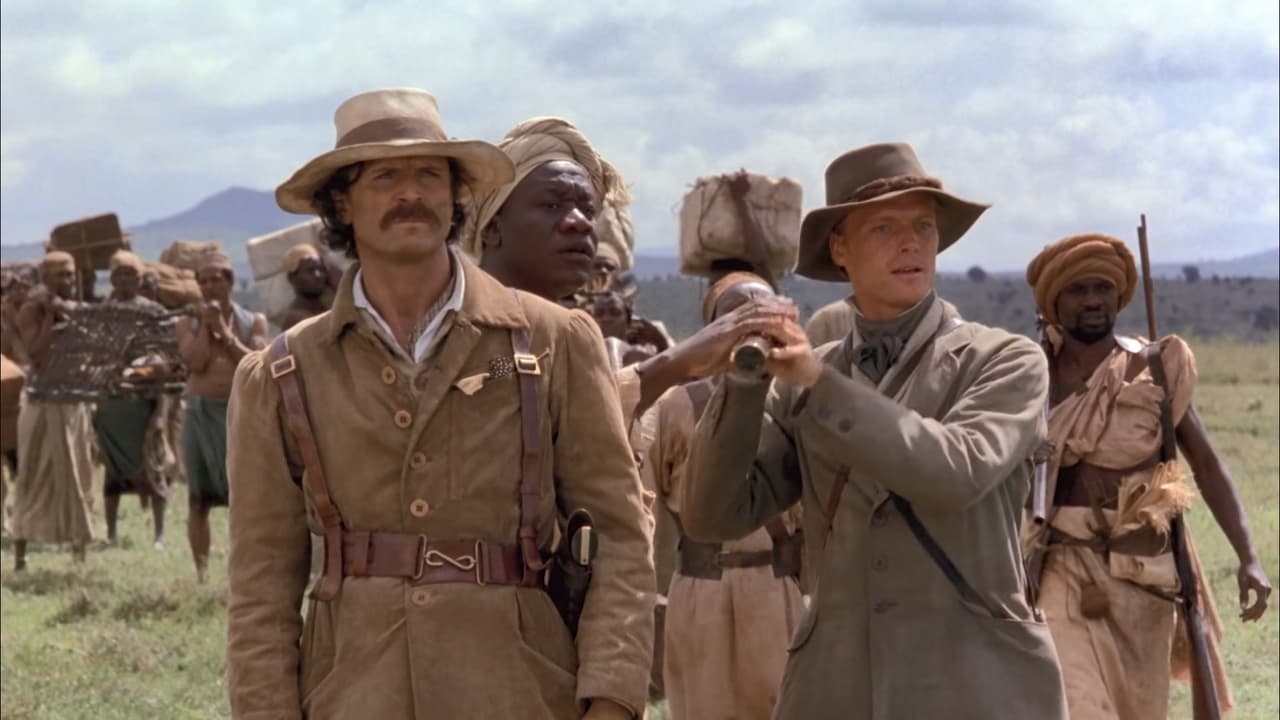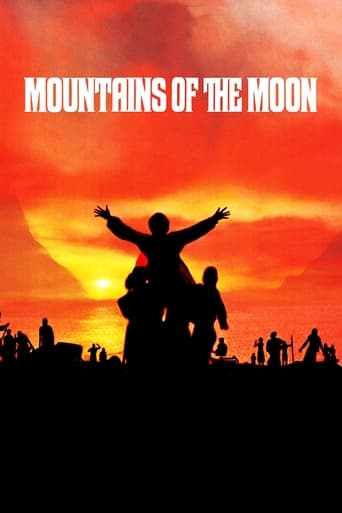

In the Nineteenth Century, the British writer, geographer and explorer Captain Richard Francis Burton (Patrick Bergin) meets the Lieutenant John Hanning Speke (Iain Glen) during a dangerous journey in Africa and after being saved by Speke, they become friends. Soon they team-up to seek the source of the Nile River sponsored by the Royal Geographic Society. Meanwhile Burton meets his fan Isabel Arundell (Fiona Shaw) and they get married to each other. Burton and Speke travel for many months through Africa where they face brutal tribes, diseases, hunger and many other dangers together. Speke finds a lake that he believes it is the source of Nile River but Burton disagrees and believes they need more scientific research to be sure. When they separately return to London, the ambitious publisher Larry Oliphant (Richard E. Grant) stirs up a quarrel between the two friends and Speke travels alone to Africa trying to prove his findings. Will their friendship end? "Mountains of the Moon" is a fascinating adventure with a story of friendship based on a historic event, the journey of Captain Richard Francis Burton and Lieutenant John Hanning Speke to the African Great Lakes. The plot may be not accurate but the film is engaging and the landscapes are breathtaking. The viewer does not feel the 136 minutes running time. My vote is eight.Title (Brazil): "Montanhas da Lua" ("Mountains of the Moon")
... View MoreBob Rafelson's widescreen, epic re-staging of the quest for the source of the Nile River is a challenging, often violent adventure, filled with dynamic action, exotic scenery, and striking contrasts between 'civilized' 19th Century England and the 'savage' wilderness of uncharted Africa. The script needs several clumsy, expository scenes to set up the characters of explorers Richard Francis Burton and John Speke, coming to full-blooded life only after beginning their journey into the Dark Continent. But is it primarily an adventure film, a story of professional kinship and rivalry (with suggestions of homosexual obsession), or a criticism of British chauvinism abroad? A little of all three is not enough of each. The overstated, blockbuster music score and a romantic subplot are liabilities, but overall the film is a throwback to an earlier era of wide screen entertainment, showing the shady politics, misplaced pride, and mortal folly of scientific exploration in an earlier century.
... View MoreI had a choice at the Cinemas back in 1990 to see either Mountains of the Moon or Total Recall. I saw both advertised on the wall next to the concession stand. "What is Mountains of the Moon" I asked my self. This is the first I have heard of it. All of my friends and I were there to see Arnold kick some but.Which movie did I choose? Yeah..you guessed it.....Like a total brainwashed Zombie I chose the Arnold Movie. I was programmed and conditioned by hype to WANT to see Total Recall and noting else.I missed seeing a GREAT movie on the Big Screen. I would give anything to go back in time and choose differently. The visuals and scenes of MOTM were very fascinating even watching this on VHS some years later. The producers/distributors obviously lacked the big budget in 1990 for Advertising that the fat cats who made Total Recall did. ALSO, most Americans are probably too ignorant of History to even know anything about the Colonial Exploration of Africa - so the desire to see a film of this genre was low staring out.IN SHORT I highly recommend this movie. If you are a thinking person it will inspire you to desire to know more about these men who braved impossible odds to explore new worlds.Richard Burton's books are available in reprints from Dover Press. Did you know that he was the first White European to visit Mecca? Yes that could have been a movie itself. He wrote about it in a great book.IMPORTANT: This movie was based on a play called "Burton and Speake" and not on Burton's or Speake's writings. There are artistic licenses taken.
... View MoreI hardly have the words to describe what I think and how I feel about this movie. Except that I find it stunning. The wild scenery where the two characters' friendship is shaped was splendid, absolutely breathtaking. It was so interesting and moving to watch Richard and John evolve around each other and get so close and united when confronted with life-and-death situations in the wilderness. The story revolves around great ideals and principles in an age of innocence, when human bonding, friendship, love, still had that touch of solemnity, honor and oath. It was very sad to see how John's deep feelings for his best, truest friend degenerate under the manipulation of a man with no scruples. The ending was heartbreaking and liberating, at the same time. The highpoint of the film was, in my opinion, when Richard is shown the unfinished bust of his late friend. The loving, nostalgic look and smile he displays while adjusting John's cheek-bones sums up beautifully the entire story of their friendship, and also suggests that John will always be in Richard's heart, as he knew him for real in Africa, when they went through so many things together, despite his naive, reckless betrayal and despite the games of interests that followed when returning to the civilized world. Truly excellent, I highly recommend it to everyone. It works magic for the soul.
... View More